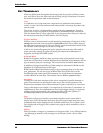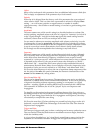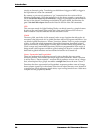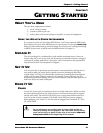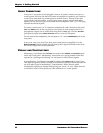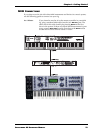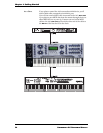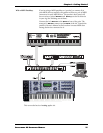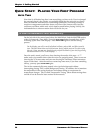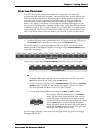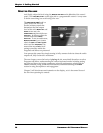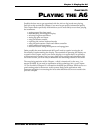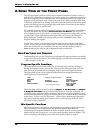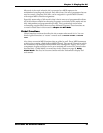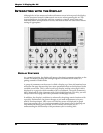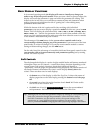
Chapter 1: Getting Started
26 ANDROMEDA A6 REFERENCE MANUAL
QUICK START: PLAYING YOUR FIRST PROGRAM
AUTO TUNE
Now that it's all hooked up, there's one more thing you have to do. If you've jumped
the gun and played a few chords, you probably heard that the unit was way out of
tune. Because the Andromeda is a true analog synthesizer, and analog circuitry is
sensitive to temperature and other factors, each one of the sixteen voices (and the
oscillators and filters within each voice) must be tuned before playing. Luckily, the
Andromeda has a software routine that will do this for you.
To tune the Andromeda's voices automatically:
On the left side of the control panel above the Mod Wheel, find the MASTER section,
with a Volume and a Tune knob. Press the
AUTO TUNE button beneath these, which
will bring up the Auto Tune display. Press
AUTO TUNE again to start the tuning
process.
On the display, you will see each individual oscillator, pulse width, and filter tuned in
turn. This takes about three and a half minutes, during which you won't be able to play
the unit. (Later, you can save time by tuning only the oscillators if you wish, by pressing
the button under
OSCFRQ in the display.)
Once the unit is tuned, you'll see a chart showing the results of the tune. A “
T”
under each voice number shows that the voice was properly tuned. There is one row
showing the VCA tune status and one row showing the Oscillator/Filter tune status
(more on this later). After the unit has warmed up some more, if you hear something
off-key, you may press
AUTO TUNE again.
The A6 also automatically tunes unused voices in the background without
interrupting playing. This is called Background Tuning. In addition, the A6 monitors
the temperature of the analog hardware and adjusts tuning to compensate for
temperature changes. This is called Temperature Tuning. (More about turning these
on and off can be found in later sections of the manual.)



